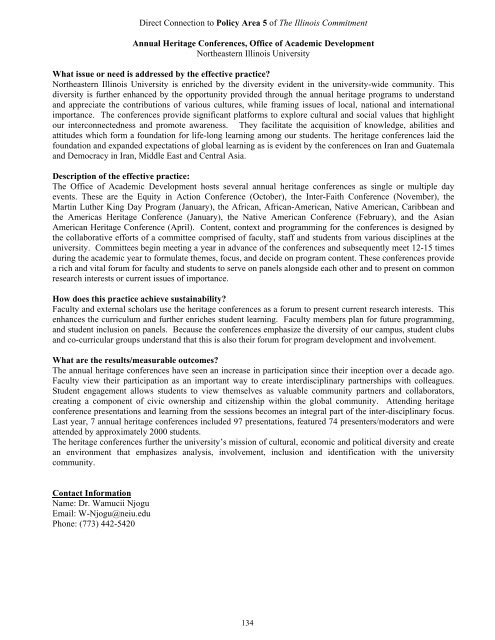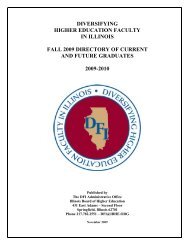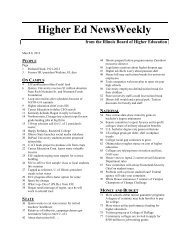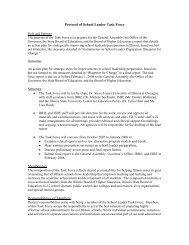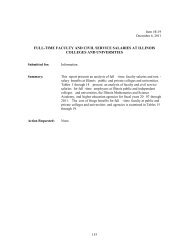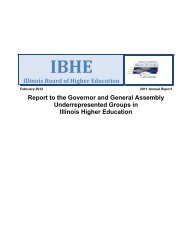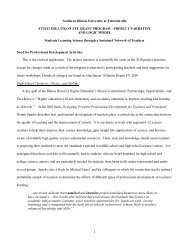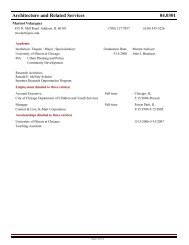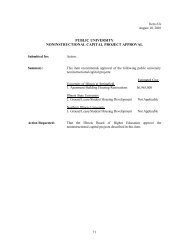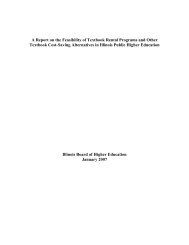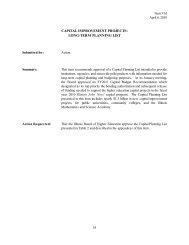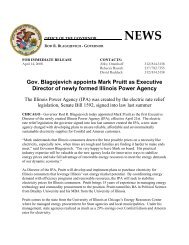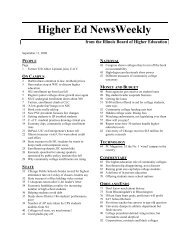Title of Effective Practice: - California Postsecondary Education ...
Title of Effective Practice: - California Postsecondary Education ...
Title of Effective Practice: - California Postsecondary Education ...
Create successful ePaper yourself
Turn your PDF publications into a flip-book with our unique Google optimized e-Paper software.
Direct Connection to Policy Area 5 <strong>of</strong> The Illinois Commitment<br />
Annual Heritage Conferences, Office <strong>of</strong> Academic Development<br />
Northeastern Illinois University<br />
What issue or need is addressed by the effective practice?<br />
Northeastern Illinois University is enriched by the diversity evident in the university-wide community. This<br />
diversity is further enhanced by the opportunity provided through the annual heritage programs to understand<br />
and appreciate the contributions <strong>of</strong> various cultures, while framing issues <strong>of</strong> local, national and international<br />
importance. The conferences provide significant platforms to explore cultural and social values that highlight<br />
our interconnectedness and promote awareness. They facilitate the acquisition <strong>of</strong> knowledge, abilities and<br />
attitudes which form a foundation for life-long learning among our students. The heritage conferences laid the<br />
foundation and expanded expectations <strong>of</strong> global learning as is evident by the conferences on Iran and Guatemala<br />
and Democracy in Iran, Middle East and Central Asia.<br />
Description <strong>of</strong> the effective practice:<br />
The Office <strong>of</strong> Academic Development hosts several annual heritage conferences as single or multiple day<br />
events. These are the Equity in Action Conference (October), the Inter-Faith Conference (November), the<br />
Martin Luther King Day Program (January), the African, African-American, Native American, Caribbean and<br />
the Americas Heritage Conference (January), the Native American Conference (February), and the Asian<br />
American Heritage Conference (April). Content, context and programming for the conferences is designed by<br />
the collaborative efforts <strong>of</strong> a committee comprised <strong>of</strong> faculty, staff and students from various disciplines at the<br />
university. Committees begin meeting a year in advance <strong>of</strong> the conferences and subsequently meet 12-15 times<br />
during the academic year to formulate themes, focus, and decide on program content. These conferences provide<br />
a rich and vital forum for faculty and students to serve on panels alongside each other and to present on common<br />
research interests or current issues <strong>of</strong> importance.<br />
How does this practice achieve sustainability?<br />
Faculty and external scholars use the heritage conferences as a forum to present current research interests. This<br />
enhances the curriculum and further enriches student learning. Faculty members plan for future programming,<br />
and student inclusion on panels. Because the conferences emphasize the diversity <strong>of</strong> our campus, student clubs<br />
and co-curricular groups understand that this is also their forum for program development and involvement.<br />
What are the results/measurable outcomes?<br />
The annual heritage conferences have seen an increase in participation since their inception over a decade ago.<br />
Faculty view their participation as an important way to create interdisciplinary partnerships with colleagues.<br />
Student engagement allows students to view themselves as valuable community partners and collaborators,<br />
creating a component <strong>of</strong> civic ownership and citizenship within the global community. Attending heritage<br />
conference presentations and learning from the sessions becomes an integral part <strong>of</strong> the inter-disciplinary focus.<br />
Last year, 7 annual heritage conferences included 97 presentations, featured 74 presenters/moderators and were<br />
attended by approximately 2000 students.<br />
The heritage conferences further the university’s mission <strong>of</strong> cultural, economic and political diversity and create<br />
an environment that emphasizes analysis, involvement, inclusion and identification with the university<br />
community.<br />
Contact Information<br />
Name: Dr. Wamucii Njogu<br />
Email: W-Njogu@neiu.edu<br />
Phone: (773) 442-5420<br />
134


